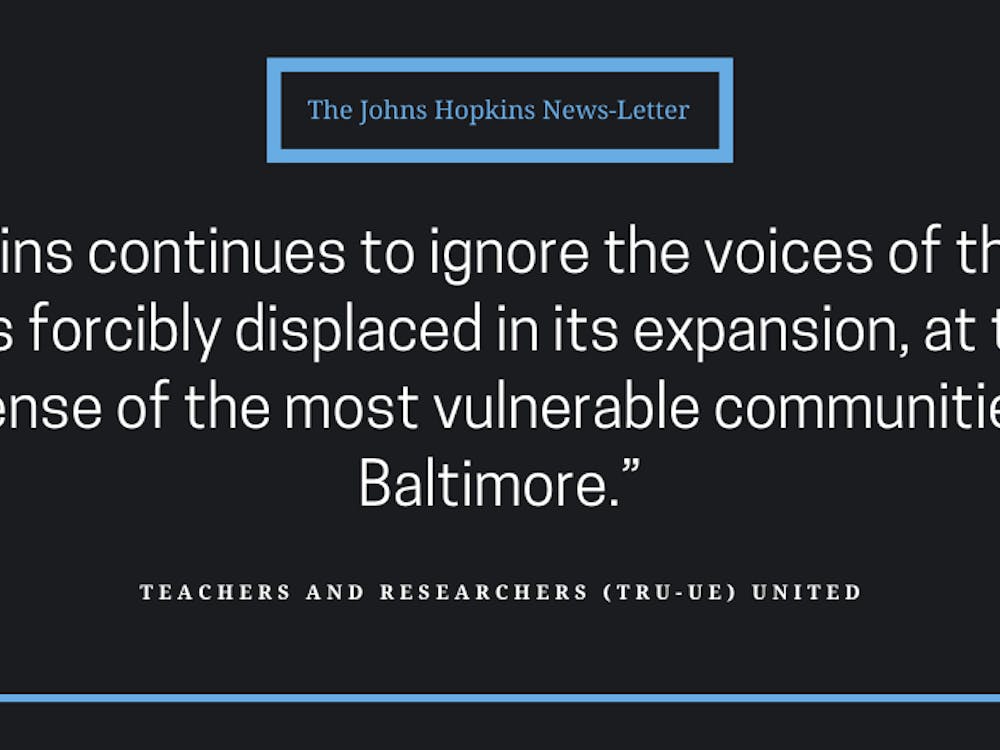Former Wall Street trader and Hopkins alum Chris Arnade presented a talk titled “Divided by meaning: An exploration of Trump” on Friday, March 31. Arnade retired from Wall Street in 2012 to document poverty and addiction across the United States through his photography series, Faces of Addiction.
Arnade said he quit as a bond trader after realizing that he had not considered how his work impacted others. He felt that he and others in his field often ignore the suffering prevalent throughout the rest of the country.
“[I’ve realized] how arrogant I was, how when people are successful, we build narratives and we build a worldview that works for us but ignore other people who haven’t succeeded,” Arnade said.
During his 20 years on Wall Street, Arnade said that he used to spend all his time focusing on the data. He felt a need to begin spending more time with and documenting the very people he had rushed by and ignored during his trading career.
“I wanted to show people [that addicts] were no different than anybody else, that they weren’t lazy, they weren’t dumb,” Arnade said. “I wanted to show how unjust it was that people on Wall Street, who had often started in very good positions, were so well-rewarded, but people who had started in bad positions were stuck in addiction and were being vilified.”
During his talk, Arnade introduced the concept of the “front row kids” and the “back row kids.” He defined the “front row” as those who were granted access to elite educations with postgraduate degrees, while the “back row” only had access to a high school education.
The “front row,” according to Arnade, has been the impetus behind the last 30 years of economic policy and regulation.
“The front row has won. [Their] definition of meaning is what drives our country,” Arnade said. “The policy that we’ve built up... of deregulating Wall Street and overregulating Main Street is a policy that’s benefitted the front row and desolated the back row. It’s a policy driven by numbers and cold rationality.”
Arnade further explained how financial and economic damage to “back row” communities through free trade has impaired their social systems and culture. He argued that as these systems collapse, it has devalued disadvantaged people’s sense of meaning and identity.
“Social networks — factories, unions, church groups — that were fed by people who had jobs all fell apart. [But] that’s the very concept of what’s valuable to the back row, that’s their meaning, that’s how they define themselves,” Arnade said. “So the front row has also won culturally [because they] determine what is sacred and what is profane.”
Arnade said that because of the discrepancy in economic opportunities available, the “back row” has had to turn to other methods. Using the analogy of playing the lottery, Arnade explained how people are incentivized to support Trump.
According to Arnade, for many who are poor, the only opportunity to possibly climb the economic ladder is through the lottery. Within this framework, playing the lottery makes sense, because it is not considered reckless in the same way those who are well off think it is. For the upper class, the status quo works for them and they are “in the money.”
“The back row kids are out of the money, and their world is not working for them, [so] their incentives for change are very different.” Arnade said. “That’s what Trump voters were doing. What seems to be a reckless decision for you might not be a reckless decision to them. [In places with] a lot of addiction and despair, it’s not surprising that there’s a lot of Trump supporters.”
He also introduced the concept of a “faux meritocracy,” in which low-income recipients are expected to climb the economic hierarchy themselves. However, Arnade points out that they often do not have the means, which then has the insidious effect of making such expectations degrading.
“We say that anyone can pull themselves up on their bootstraps,” Arnade said. “We celebrate people who do that, but the flip side of that story is that if you didn’t make it out [of poverty], it’s your fault. If we claim a meritocracy, we’re saying that the people at the bottom deserve to be there. That’s humiliating.”
Arnade also highlighted some problems he has with the Democratic Party’s platform. He said that the Democrats address the concept of white privilege, but fail to help the working class economically.
Arnade criticized the Democrats’ approach toward the white working class.
“The Democrats need to cut their ties with Wall Street, they need to rethink their concepts of free trade, and they need to ask the working class what they want, listen to them and provide for them to be a true party of the working class, not just a party that is kind of for the working class but really for Wall Street,” Arnade said.
For Arnade, education is the primary step in providing economic stability and meaningful employment.
“The biggest divide in our country is education. Presently, for a lot of people in certain communities, getting a good education is often a matter of birth luck, it’s a matter of location,” Arnade said. “I would like there to be more equal access to education for everyone.”






















Please note All comments are eligible for publication in The News-Letter.